#just-late-roman-republic-things
Note
I would love to hear your opinions about ancient currency! And any recommendations you have for learning more about the Roman economy!
oh boy i am SO glad you asked! I'm going to put everything under a readmore because it's a Lot.
I have a few opinions on Greek coinage, specifically that of the introduction of coinage to Athens, though I'm working on a proposal for studying Spartan coinage rn.
Current publications re:Athens haven't really determined For Sure who introduced coins; it's a toss-up between Solon and Pisistratus but I'm in the Pisistratus camp for reasons that I can absolutely summarize in a separate post, as I've written and published a paper in my undergrad journal that (hopefully) holds weight in the current hodgepodge of thoughts. If you'd like that, I can write it up and link it here!
Re:Spartan coinage, I think the Spartan homoioi were real idiots. Most city-states were using silver (and very occasionally gold) for their coins, but Spartan homoioi were using iron spits. The spits (obeloi) were six to a drachma, which was the exchange rate for a long time. And by long time I mean there was no such thing as a floating conversion, coins were just the most portable form of precious metal, which was intrinsically valued. Outside Sparta (even the perioikoi) most city-states would have used ingots pre-coinage and that evolved into stamped metal, i.e. coinage. The Spartans considered themselves to be very religious and followed the Great Rhetra (unsure if Lykourgos existed), which maintained that silver and gold were holy and could not be used, so they used iron.
Unfortunately, the rest of Greece didn't follow that, and used silver in their coins, especially influenced by Attic-Ionian city-states who were in regular trade with Persia and further east, i.e. regions that valued precious metal outside their religious significance. Essentially, Spartans kinda screwed themselves over re:trade outside Sparta; they couldn't even trade in contemporary currency with the rest of Lakonia and forced their subject city-states into the same position. This is supported mostly by the explosion of Messenian and other Lakonian coinages after Sparta collapsed, though I want to see if I can find more text evidence, since I (an archaeologist) tend to rely too heavily on material. It's a whole thing, personally I believe this was a significant factor in Sparta's collapse, though other things factored in as well. Sparta was incredibly insular both in its trade/economy and religious practice and that combination led to its downfall.
For the Roman sources, I recommend starting with the Cambridge Companion to the Roman Economy by Walter Scheidel, and The Ancient Economy by Walter Scheidel and Sitta von Reden. Von Reden has excellent articles related to the ancient economy in general, and most are available on JSTOR, so I recommend giving her stuff a look.
I also highly recommend reading Moses Finley's work The Ancient Economy (no relation to Scheidel and Von Reden's work), as it lays the foundation for much of our current school of thought. Peter Temin's subsequent work, The Roman Market Economy argues against Finley and kicks off a whole debate about how to define an economy without using capitalism as the basis, because capitalism as we know and define it did not exist then, and it is incorrect to assume that. We can call it protocapitalist, but not capitalist.
Slavery in Rome is a nuanced subject that is integral to learning about its economy — I suggest keeping an open mind and treading carefully with respect to post-1492 slave trades. Noel Lenski's chapter "Framing the Question" (linked; you need access through your institution) discusses the slave trade against a Finleyan model, while Scheidel (him again) talks about how to determine the wages of slaves (JSTOR link). W. V. Harris talks about the demography and geography of slaves here (JSTOR link). These three are good starts for learning about Roman slavery, but if you want more sources, I can pull some up for you.
I don't want to overload you with sources, so in general I'll recommend anything by Scheidel, Von Reden, Nicholas Purcell and Peregrine Horden (connectivity), Seth Bernard (coins and emissions), Astrid Van Oyen (tech innovation), and Willem Jongman (economic structure). As with the slavery sources, if you want direct links I can definitely find them for you! I'm always happy to share info :)
70 notes
·
View notes
Note
6 and 8 for the history ask meme!
I sorry I took so long to answer this! I kept putting off answering and then I kind of forgot.
6. HF I never expected to like as much as I do
I think it has to be Claudius. For context, we're going to have to back up a few years.
When I was a little hellaboo and loved ancient Greece and stuff, I vowed NEVER EVER to like ancient Rome. I HATED ancient Rome and I was always like "Omg I'd never forgive myself if I started liking Roman history! Ancient Rome is the worst and ancient Greece is the best and it's everyone's problem!" Yes, I was that type of ancient Greece fan :(
And then I found out about Claudius and fell in love with him. Lol!
8. An obscure HF who needs more love
Britannicus!
I'd kill for a historical fiction novel—or any historical media for that matter—from his perspective. It would be so interesting! He's often kind of forgotten in the late Julio-Claudian dynasty. If he ever shows up in historical fiction, he's mostly just used as a little side piece to show how evil Nero and/or Agrippina are. We never often get to see what he thinks and details about him and stuff like that, which is a shame.
I think historical fiction about him has so many opportunities to be amazing and interesting! I liked Kento Ankokuden Cestvs because it actually got into a bit of detail about Brit and his emotions and his relationship with Octavia. Alas, Britannicus is only a minor character in it.
With actual non-fiction historical works, not going to lie, I can't blame them for not going very in depth with Britannicus. Because honestly, we don't know that much about him. He was also a child and not very important most of the time. So I totally understand why the modern sources about him are a little sparse.
But, I am yet to find a true deep dive into whether he was poisoned or not in English! At least, one I'm happy with. Anthony A. Barrett doesn't count; he wrote like one paragraph and failed to go into detail. Anyway, I do think maybe we Anglophones should step up a little with Britannicus in academia. The French are beating us!
"Well why do you like Britannicus so much?" you might ask. And I don't know honestly. I liked him for a reason, but at some point, I forgot that reason and continued liking him. And now, I've just been liking him for so long that of course I'm going to continue liking him.
7 notes
·
View notes
Note
Just wanted to say that I never know what weird (but cool) stuff you'll share next, but it always makes my day brighter. I hope you have a wonderful week!
Awh thank you!! I hope you have a wonderful week as well :~D you're one of the most interesting accounts I follow, and I love both your more serious historical/activism posting and your more jokey meme posts ^_^
1 note
·
View note
Note
Have you seen Anthony Everitt's new book about Nero? I haven't read it yet but I like other books by him, and it seems right up your alley.
No, but thanks for notifying me! I have to get a hold of it asap! I collect books about Nero like crazy and I have just about any that I could find (including Quo Vadis, which I mostly use to wipe my ass when I'm running low on toilet paper).
Thank you for thinking of me 🥺
1 note
·
View note
Text
Ancient Roman Poets on a Modern Date
Catullus (Gaius Valerius Catullus)
If you meet him before Lesbia, he will be charming, eloquent, and happy to go wherever you like, although his funds could be limited. Even so, he'll make sure you both enjoy yourselves. Theater or concert tickets in the plebian--nosebleed--section, for instance. If you meet him after Lesbia, there is a possibility he will spend the entire time trauma-dumping about his ex. If you also have one to complain about, this could be cathartic.
Vergil (Publius Vergilius Maro)
He takes you out to his beehive dressed in full bee-keeping gear to introduce you to his bees and then goes inside, where you sample different varieties of honey drizzled over fruit. He is sweet, but does talk about fields and bees a lot.
Ovid (Gaius Valerius Catullus)
Let's be honest. This might be more of a Tinder or Grindr hookup than a date. However, it's possible you met at a theater, race track, parade, or seaside resort. If you are aro/ace, run away. If you aren't and you are interested in seeing if he truly is proficient as a teacher of love, stick around. Don't expect him to be faithful, however. And although his manners are perfect, remember that it's an art and a game to him, so guard your heart.
Horace (Quintus Horatius Flaccus)
He'll take you out for a night of expensive dining and pay for it solely because the friend of a friend that owns the place owes him. He is charming company and can get you into any exclusive club or private experience you want to go to, but will expect reciprocated favors. Also, he turns on the charm, but absolutely expects to be complimented in return.
Sulpicia
She plays hard to get initially, not wanting to be too obvious with her affection. The first date will be YOUR choice. Pick well and she'll follow that with a candlelit dinner and eternal devotion. She does have expensive taste, however, and she would absolutely report you to her scary uncle if you break her heart.
Martial (Marcus Valerius Martialis)
He takes you on a picnic. Despite this being in the country, he'll opt for fine wine and gourmet food. He's easy to talk to, funny, and catty with his gossip. However, he'll also go on about his childhood in the country and how he went hunting and fishing and how he misses the simple country life. (All while sipping from an expensive goblet.)
Livy (Titus Livius)
He takes you to a museum and acts as your tour guide throughout the entire thing. Who knew that your date would double as a living and breathing audio tour? You're supposed to eat at the museum cafe, but you may not make it there before it closes... If you're a fan of history, you're in for a treat.
Iullus Antonius
Iullus is a huge romantic and just as charming as his famous father. He will show up with flowers and take you on a date in a small, undiscovered restaurant and to a lot of cute places that are off the beaten path. Whether you hit it off romantically or not, he's the kind of guy who could be your ride or die. (Spoiler alert, when he says he's your ride or die, he's extremely serious. 💀)
Albius Tibullus
When he falls, he falls hard. He takes you on a date in an orchard. This includes picking grapes and then tasting wines. If the date is before he was entranced with one of the lovers he wrote about, all is well. If not, he might get a little teary eyed about his past love(s). He is polite, sweet, attentive, and apologetic though.
Juvenal (Decimus Junius Juvenalis)
He takes you to an expensive restaurant and makes it clear he is only paying for HIS meal. The entire time he criticizes everyone else in the restaurant for being posers and judges them based upon appearance, status, and gender. His date is not a safe place for anyone who doesn't fit his definition of traditional values. Definitely talks about kids these days and the degradation of society.
#inspired orginally by @just-late-roman-republic-things#ancient rome#ancient roman memes#classics memes#ancient roman poets#okay yes I added Iullus because I feel bad for him and Julia and I wish some of his poetry had survived#and yes some scholars believe sulpicia isn't actually a real historical figure or did not write the poems but I wanted representation#and personally Iullus or Virgil for first choices#tho I love catullus and would also pick him#national poetry month
115 notes
·
View notes
Text
there are churches in attis..
#insane to try and figure out a timeline for this fucking book. but that means the whole jesus thing happened#and that happened because of. WELL. the Romans™. but the romans that would have had to have existed for the timeline#of events that led to jesus' crucifixion ie probably all of the guys in the late republic for augustus to do stuff + then. empire. tiberius#etc. are in the period that the book actually covers. so. ????#whatt ever its probably some weird time textual loop thing situation. guy who needs to stop thinking about this book voice#or maybe i just missed the point of it. sad!#attis
14 notes
·
View notes
Text
girl why are you using "left" and "right" while talking about 44 BC, whyyy
#I'm reading an introductory essay on Sallust's de catilinae coniuratione#and the author in order to analyse some aspects of Sallust thought and work is ofc talking about the political context of the time#so far so good right?#wrong#why the fuck is she saying that marius was 'the leader of the left'??#I mean I get what she means but... no girl no.#you cannot use these concepts to explain late republic roman history. not only it's simplistic but it's just wrong..#she's talking about political parties.. there were no political parties in the late republic early principate#idk maybe Im more upset than I should be#but this is definitely a huge pet peeve of mine#personal#university things#sallustius#de catilinae coniuratione
10 notes
·
View notes
Text




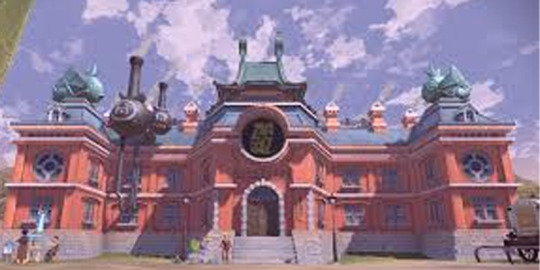
So, with the new legends there's a neat way we can take a guess at some of the time frame. Although it's largely aesthetic and hard to gauge the intended historical parallels of, the not-Eiffel Tower at the center of the city could presumably have been completed in the late 1880s like the real thing. Interestingly that places it pretty concurrent to the construction of the Hokkaido Government building in the 1870s that served as the basis of the Galaxy Team HQ in the first Legends game.
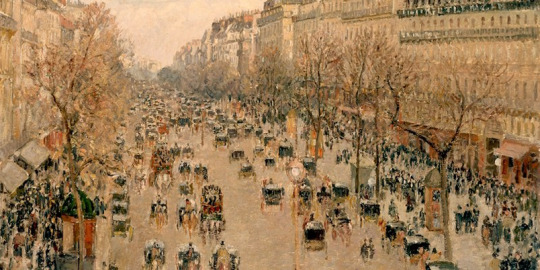
But with the keywords being "urban redevelopment" the setting could only possibly be Haussman's renovation of Paris that took place from the 1850s-1920s. So given that the tower is already standing, that places Legends Z-A between 1889 and 1927.
And I doubt it would play into the setting of a Pokemon game but I think it's neat that it would mean taking place firmly in the 3rd French Republic, as that's not typically the most romanticized period of French history. (Kind of shocking given just how much Japanese pop culture loves to fixate on the Ancien Regime and Rococco architecture.) It's right at the height of the French Colonial empire and their rivalry with the British... Even if they don't address the history directly, certainly not the darker bits, I wonder if we'll see an ancestor of Rose* and some mention of Kalos and Galar's relation as a hint at the Pokemon world's equivalent of India. (Elephant, what elephant...)
*put a pin in that... Well come back to Rose later...

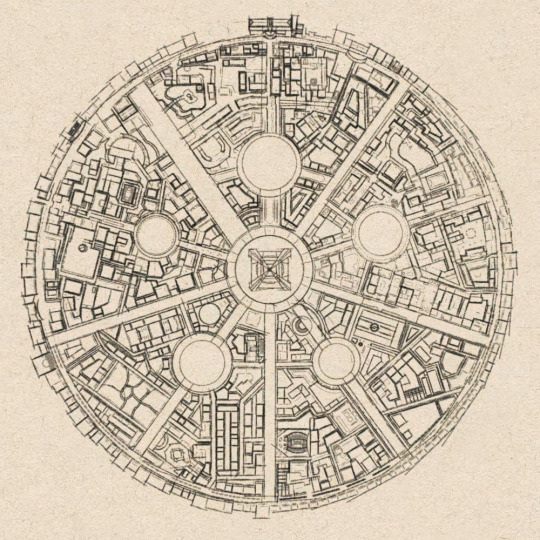
Also I know a lot of the stupid "leaks" that were just running with any/every rumor they could find had been talking about Celebi, despite there being no signs of it in the direct, but it's possible that the Z-A title and the fadethru of the sort of sci-fi looking city diagram into a pencil and parchment one is indicating going back in time --backwards, from Z to A, end to start.
and just so long as I'm just picking at edges of things...

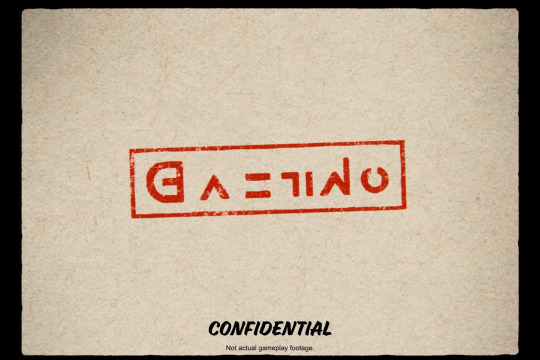
The unknown are an anagram of, "POKEMON PRESENTS"(oh and the SOEYUE one at the end is just "SEE YOU") and the ""confidential"" stamp on the documents likely reads "Gokuhi" as in gokuhi[極秘]: "Top Secret," but the rest of the text doesn't seem to match either Japanese, French, or English,
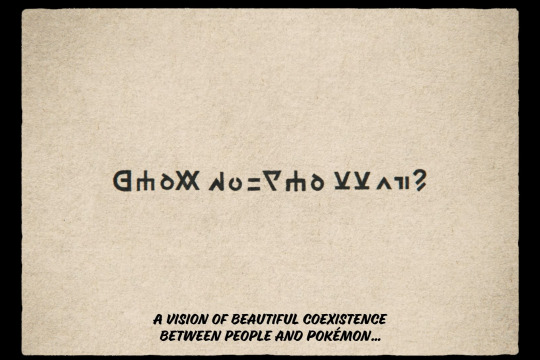
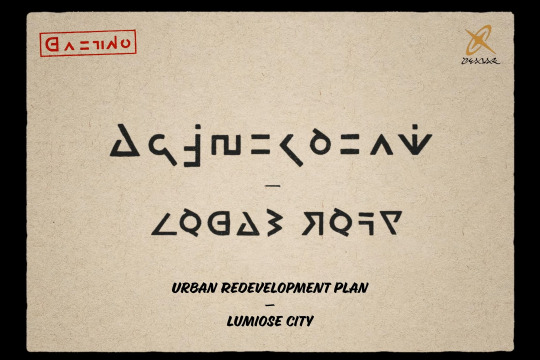


Hito to POKEMON no kyouzon o yumemite[人と ポケモンの共存を夢見て]: "Dreaming of people and Pokemon's coexistence"
Toshisaikaibatsu hassou MIARE CITY[都市再開発発想ミアレシティ]: "Urban Redevelopment Concept Miare City"
The obvious exception being that redacted text is clearly the romanized MIARE from the Japanese MIARE[ミアレ] and the English CITY, which is the Japanese name for what was localized as "Lumiose."
Curiously the word "Pokemon" is very clearly missing from the passage, and also in both cases there are too few "Galarian" characters for how long the phrases are in any actual language.

and finally, given some of the existing examples of handwritten Galarian in SwSh, I'm guessing the text on the big logo is as i've transcribed into the more standard Galar font, although I'm really uncertain about that second one, and a bit iffy about the big "X"s, but the little cyclone O, the V with the underbar, and the E seem certain enough.
Also there's a logo I know I remember seeing that looks like this one but I can't remember where it is or what it's associated with.... It's the logo on the Macro Cosmos power plant. Not Rose's personal logo with the stylized rose, and not the Cosmos business logo with the big star system orbital ring Cs, but the power plant in Hammerlock where you go to fight Eternatus specifically.
It would be really neat if whatever this organization is was tied back to an ancestor of Rose and Peony and the origins of Macro Cosmos somehow.


661 notes
·
View notes
Note
i am curious about robespierre and camille and “doomed by the narrative”, if you are free i would love to learn some more about them since i only have basic frev knowledge!
- @iron--and--blood
Thank you so much for the ask! ✨

The short version is that they started off as school friends and got separated for a couple of years after finishing their studies. Then the revolution started in 1789 and brought them together again by uniting them in their shared goal, only to completely tear them apart in 1794. And by ‘completely tear them apart’, I mean that Robespierre was one of the people who signed the decree for Camille’s arrest which led to his execution in 1794. Talk about star-crossed…
The answer would not have been possible without this great article by @anothehumaninthisworld btw! Definitely go read it if you haven’t already and are craving more information.
Both Camille Desmoulins and Maximilien Robespierre studied at Lous-le-Grand, the former Jesuit school, in Paris. Camille was 2 years younger than Maximilien, but they definitely knew each other, and there is a strong suggestion that they were friends back then. Later, Robespierre calls Camille his ‘study companion’, ‘college comrade’ and (and this will be important later, so just put a pin in that) ‘a talented young man without mature judgement’. Their favourite topic to discuss with each other was apparently the Roman Republic - because of course it was. I also like to imagine they bonded over their enthusiasm for classical authors!
Although two years is not that much of an age difference, a lot of people (including Przybyszewska, who takes it to the max) picked up on the fact that their dynamic was kind of like this:

picture by @did-slid-skid (hope it’s okay to share it, if not then I’ll take it down. Give it a like here!)
…and it sort of continued to be like that until the bitter end, but let’s not get ahead too much.
Once the revolution kicked off and Camille started publishing his first newspaper, he seems to have tried to capitalise on the fact that he knew Robespierre,whose political career at that time was already gaining significant traction (in a bit of ‘I’m so proud of my famous talented friend! Just look at Robespierre! And have I mentioned he is *my* friend?!’ kind of way). At this point, Camille might have had an incentive to exaggerate their closeness a bit to help his own journalistic career.
But I think it’s fair to say their relationship became closer once again sometime during 1790 since Robespierre was not only a witness at Camille’s wedding to Lucile, but he also became a godfather to Camille’s and Lucile’s son Horace, according to some sources. And if not a godfather, then definitely at least an occasional babysitter.
Also not super relevant from a historical perspective but the wedding scene in La Revolution Francaise is very cute, despite the film's many issues:

Then, around late 1793 and the first half of 1794, things got really messy. I mean, they were always really complex of course, it was the revolution and fractions kept forming and falling in quite a rapid succession. I mean messy specifically in regards to Camille. To put something really complicated as simply as possible, Camille started to be associated with the Indudgents/Dantonists - a name coined for the political fraction which included figures like Georges Danton and Fabre d'Églantine, who was involved in a massive corruption scandal.
Around that time, Camille also started publishing a newspaper – La Vieux Cordellier – which criticised the actions of the Committees and as such, came to be seen as something that was actively undermining the authority and the efforts of the revolutionary government.
There was quite a heated public exchange between Camille and Robespierre in January 1794 at the Jacobin Club. It also marks one of the greatest instances of what I like to call ‘using Rousseau as a weapon”.
Basically, Robespierre ordered Camille to destroy the copies of his journal, to which Camille replied by quoting Rousseau and saying "to burn is not to answer." It's important to know that Rousseau was *the* hero of Robespierre - a fact of which Camille was fully aware - so this was meant to cut deep. It must have stung!

Robespierre then replied “Learn, Camille, that if you were not Camille, one could not have so much indulgence for you”. This to me really illustrates the nature of their relationship at this point in time.
I am not sure how much of this is actually historically accurate and how much is my view based on the interpretations of their relationship in the media, but the sense I get is that Robespierre was quite protective of Camille until he felt like he had no choice but to move against him.
Despite the small age difference, there seemed to have been kind of an older, wiser person in a protective role/younger man led astray (or, if you want to go the Przybyszewka's route, acting like a brat) dynamic. Robespierre is quoted referring to Camille as a ‘spoilt child’. I mean, Camille might have been one of the first people to be called enfant terrible (I swear I saw it somewhere and did not hallucinate it, right?), despite being a man in his 30s.


Camille's whole vibe is somehow 30+ going on 14. Like that's pretty much a historical canon.
But then, in one way or another, the situation reached a point where for Robespierre, the importance of preserving the revolutionary cause outweighed the importance of friendship with Camille - his old college comrade. (DOOMED BY THE NARRATIVE!)
In March 1794, Robespierre, as a member of the Committee of Public Safety, was among the people who signed Camille’s arrest warrant and thus, with a stroke of a pen, sealed his fate.

blood and ink parallel etc etc you get it ~
According to Robespierre’s sister, Charlotte, Maximilien tried to visit his friend in prison. I'm including a longer version of the quote because it is fascinating! Przybyszewska includes this supposed event in her play, The Danton case. It is also something which I may or may not have capitalised on in my own writing. Ahem.
"all I know is that my brother had much love for Camille Desmoulins, with whom he had studied, and that when he learned of his arrest and his incarceration in the Luxembourg he went to that prison in the intention of imploring Camille to return to the true revolutionary principles he had abandoned to ally himself with the aristocrats. Camille did not want to see him; and my brother, who would probably have defended and perhaps saved him, abandoned him to the terrible justice of the Revolutionary Tribunal."
An important question though is whether we can trust Charlotte as a source here… (most likely no?) If it were true though, it just screams doomed by the narrative (and own hubris?) to me.
Lucile Desmoulins, Camille’s wife, meanwhile tried to plea for Camille’s release by writing to Robespierre and trying to remind him of his and Camille’s friendship:
Have you forgotten these ties which Camille can never remember without tenderness? You who prayed for out union, who took our hands into yours, you who have smiled at my son and whom his infantile hands have caressed so many times (…) Even if he (…) hadn’t been as attached to the republic, I figure his attachment to you would have functioned as a substitute for patriotism, and you think that for this we deserve death?
(I’m not crying you’re crying)

Lucile’s letter, however, did not help to change Robespierre’s mind and overturn the decision. On 16 Germinal Year II (5th of April 1794), Camille Desmoulins was executed, along with other Dantonists.
Just one more line that always makes me sad, to really rub it in as a special treat – from Camille’s letter to his wife from prison:
“I have dreamed of a Republic such as all the world would have adored. I could never have believed that men could be so ferocious and so unjust.”
Or, as @anotherhumaninthisworld aptly puts it in the tags, Camille and Maximilien’s relationship essentially boils down to this:

(Really funny, but ouch.)
Their relationship also features prominently in the works by S. Przybyszewska, an early 20th century Polish playwright who very much picks up on the potentially queer vibes of Camile's and Maximilien's dynamic and just runs with it. She's much loved by the French Revolution Tumblr fandom for writing what is essentially a beautiful extremely angsty historical RPF in the 1920s.
#thanks so much for the ask!!#asks#french revolution#frev#camille desmoulins#maximilien robespierre#robesmoulins#frev community#history#1700s#18th century#frevblr#robespierre#charlotte robespierre#lucile desmoulins#doomed by the narrative#stanisława przybyszewska#the danton case#la revolution francaise
79 notes
·
View notes
Note
Thank you for the correction! I'm sorry if I made you sad. I hope the rest of your day goes well.
No, don't worry! I'm alright. I hope the rest of your day goes well too :D
2 notes
·
View notes
Note
Mustard and cider. Also, you have excellent taste and your posts often brighten my day.

(image for reference)
thank you so much!!! i think you're super cool so this ask made me really happy. the amt you post from roman sources has helped me learn more ^_^
1 note
·
View note
Note
Omg please give us more info of HRE and Italy 😙 what is their story?
(Of course dear anon! But first, I have to warn y'all: HRE's canon characterization is...a big mess. As a history nerd, I tried to find a more "accurate" way to depict him, so if it distances a bit from canon I am sorry! Also chibitalia makes no sense along with chibiromano, so we scrap them here. Long post ahead.)
Italy-HRE relationship: my take on it!🇮🇹
Before actually starting to look at their relationship, I think I have to make it clear that I envision HRE as Germania's son rather than grandson. That is because it is a general conception that both Prussia and Germany are Germania's sons, and so to make HRE his grandson (mind you, HRE is older than germany!) makes...no sense. Also, if you think HRE is Germany, this depiction might help. Moreover, this headcanon is more of an help to keep the plot linear rather than an historical fact.
Another point is his age. I really do not like chibitalia, and think that the whole thing of making Feli dress like a girl is...creepy? So again, I scrap this whole bullshit, since HRE and Italy are already several centuries old when they start having a relationship. HRE officially was created in 800 with Charlemagne, but similar to the Italy Brothers case, I depict HRE being "born" a bit before that, since he is Germania's son and was most likely alive before his dad died (poor guy). That makes him a bit younger than Feli.
So we come to the year 800! A 11 year old looking Feli is brought in the new and shining Holy Roman Empire and he...is not enthusiast about it.
HRE says in canon that he started loving Italy ever since the 900s, and I actually really like this touch. The first century is most likely feli getting used to live in such a different context, and their relationship was not good at the start. So HRE actually having a middle school kinda crush for one of his territories is actually so cute. Mind you that here they were still fairly young looking, so it was mostly puppy (for now unrequited) love between a young empire and his conquered land.
Fast forward to roughly 4 centuries! Both HRE and Feli grew up to their late teens/early adulthood, and the latter in particular started to gain more and more autonomy from his "young emperor". Venice was starting to affirm in Europe as a powerful Republic, the duchy of Tuscany flourishing with arts, Genoa becoming a maritime power... y'know, he was getting bitches around Europe.
And HRE? The crush for Italy just never left, and it only got stronger as they grew. Feli was now his sorta-equal, and he admired him so much at this point. And so I hc that roughly around the second half of the XIV century, they started "dating". (Oh and to make it clear, I don't make the whole "HRE thinks italy is a girl blah blah" because gay rights♡♡) whereas it was their first serious relationship with another nation.
I like to hc that HRE gave Feli his "Veneziano" nickname, since he used to call him "his beautiful veneziano" everytime they met. because they both struggled a lot during that time, with Feli trying to manage the rivalries between Tuscan cities and HRE managing whatever the hell was his empire (LMAOO).
now, regarding the death of HRE, the official date of dissolution of the empire was around 1806. in hetalia however, it is implied that HRE died in the Thirty Years War, and so that bring us almost two centuries before in 1648. I honestly want to keep this as the period that he died, mostly because it adds more...tragicness? to it. although I have to bang my head against a wall trying to understand who the hell replaced this guy after his death. (Prussia?? Austria??)
anyways, this guy goes to war and he NEVER returns. nation death is not common, and especially not something that happens everyday, so across Europe it was a big shock to hear when across the battlefield the corpse of the once Holy Roman Empire was retrieved. And you can also imagine the utter shock that feli upon learning about his lover's death.
It scarred him, a lot. HRE was his "first love" and he was the one that gave him the utmost respect. even months after his funeral, feli still waited for a letter from him hell, one singular word even! but of course, this was just a product of his grief stricken head. this is also why I headcanon him as being very frivolous in his sentimental life, since the only time he had love, it had been ripped away from him in the cruellest way possible.
#hetalia#hws hre#hws italy#headcanons#this is also a long post eheh#hope you guys like it!#do i tag it as gerita tho#uuuuh fuck it#gerita
46 notes
·
View notes
Text
Inspired by @just-late-roman-republic-things' lists like this. XD I love them so much I had to try one.
The way ancient politicians escape a corn maze.
Octavian: He has scouted the route in advance and plotted a course. When he gets lost, he follows Agrippa out and takes the credit.
Agrippa: Literally the only one who finds his way out easily and on his own. He was never lost.
Mark Antony: He makes his way through somehow despite not planning a path. If he hits a dead end, he just pushes through the corn. At least once he hides in the corn and jump-scares Octavian to make him scream.
Lepidus: He entered the maze, but no one saw him exit. No one searches for him. Octavian says he made it home and Antony agrees. The fact they agree on this is concerning...
Cicero: He solves the layout immediately but then second guesses himself. As he walks, he audibly describes his thought process, pausing at every turn. Everyone behind him is in agony.
Dolabella: He sets the maze on fire after he finds out he still owes the entry fee and they won't waive it. He tries to blame Mark Antony.
Julius Caesar: He sends flunkies through to scout the maze for him and follows after they give him a map. He is dubbed the first to navigate the maze successfully.
Pompey: He gets lost on his own so he bribes someone to lead him out and after he exits, calls anyone else who had assistance to escape a cheater.
Crassus: He bought an aerial view of the maze beforehand and uses this to get out successfully. After Dolabella sets the maze on fire, he tries to sell the owner insurance.
Brutus: He navigates the maze successfully after he bands together with Cassius and essentially follows his friend out of the maze. Somehow he's the one who gets all the credit.
#ancient rome#ancient roman politicians#octavian#gaius julius caesar octavianus#mark antony#marcus antonius#lepidus#marcus agrippa#cicero#publius cornelius dolabella#gaius julius caesar#magnus pompey#marcus licinius crassus#marcus junius brutus#cassius#ancient history#the idea was from just-late-roman-republic-things#i just wanted to try#ancient memes
143 notes
·
View notes
Text
@snazzyjazzsounds
it’s weird how for much of human history “democracy” was just like. technologically unfeasible within a medium sized state.
on the one hand i’m a big fan of, like, material conditions as an explanatory factor for social and political structures. on the other, i’m wary of letting the dicks of history off for their dickishness, as if it was impossible to know or nobody ever suggested that war and slavery and exploitation were bad, because, y’know, they did.
i think the paucity of something we might call democracies in the ancient world is due to several factors:
1) states originating as wealth-extraction machines. the earliest states seem to have approximately in common the monopolization of a valuable resource, as in hydraulic despotism, and a degree of keeping people in place by force, so elites can glean the excess of farmers and live without having to do food production themselves. sometimes this supports things people consider to be socially valuable activities, like the upkeep of temples, and sometimes not. but if you want to live in an egalitarian society, even one with villages and farming and whatnot, your best option is the extremely vast territory outside the control of organized states, which at least back in the beginning of Sumerian civilization is, like, most of the Earth. States compete over resources and optimize for better resource extraction, and more sophisticated hierarchies and ideologies that enable them to control larger territories, but the goal of “roughly egalitarian society without a ton of coercion” is exclusive with the goal of “live within the boundaries of a state.”
and i think a lot of ancient commentators noticed this; this is why the Tao Te Ching seems so down on the whole idea of statecraft to begin with, and why it paints the picture of an ideal society being one where the people of one state can hear the dogs barking in the next state over, but have never met those people face to face in their lives. because it was written in a period of fierce inter-state competition, and it did not escape the authors’ notice that states were mostly a bad deal for the people who lived under them.
(as we might also notice of the Roman Republic and Ancient Greece, even “democratic” forms of government were ways of brokering power-sharing between elites; most people living in ancient democracies had no ability to participate in their political systems.)
2) infrastructure is expensive, communication is hard. as you note, how the fuck do you coordinate a medium-sized democracy when it takes days to get a message from one end of your state to the other? on the one hand, yes, very big states did exist in this period, like persia. as did states with comparatively well developed apparatuses, like rome. but a lot of how big states operated historically was delegating to local elites--you tax the big men in the province you just conquered, and trust them to figure out how to get the most money out of their peasants. our modern idea of democracy is in many ways predicated on our modern idea of a state, which is somewhat different an animal than an axial-age kingdom!
and a big part of why this is so difficult i feel like has to be linked to the small size of towns, which is linked to the fact that most of the population had to be farming, because the amount of extractable surplus from the rural population was small.
for centuries--longer than the industrial revolution itself, maybe since the late middle ages--my sense is that the yield per farmer has been gradually increasing, which in addition to the population growth enabled since the industrial revolution itself has really vastly increased the amount of time we can spend on things other than producing food. and i suspect that that means states have a lot bigger pool of manpower available to them to assist in their administration, and gives them the capacity to do things like be run for the benefit of a larger subset of their population--and in turn for the population to demand that they be run that way.
3) i suspect lots of ancient societies were run in ways we would approve of, i.e., comparatively egalitarian, not terribly exploitative. i also suspect these societies didn’t look much like (their neighboring) states. you’re not building pyramids for the pharoah if you don’t have pharoahs after all. your court officials are not writing histories of your dynasty if you have no court and no dynasts. so these societies, along with very many others, leave less of a historical impression.
but i don’t want to overly romanticize the past; lots of societies that left no lasting historical record also probably sucked ass. slavery is observed even among hunter gatherers. humans can be real dicks, and we have, as terry pratchett noted, a really unfortunate tendency to bend at the knees.
108 notes
·
View notes
Text
It is ever obvious that people increasingly look at the Republic through the lense of "late Republic has allegories to contemporary (late 90s-early 2000s) us politics, us bad, Republic based off us = Republic bad, Jedi bad for being tied to Republic is bad because Republic is bad, no there is no nuance here, Republic bad so that make Jedi bad"
This misses the point
Lucas was certainly making an allegory to contemporary (late 90s early 2000s) us politics, but Lucas intent does not seem to be "us bad, Republic is us, so Republic bad"
He was criticizing the state of us politics to be sure, and warning of where things could go, but Lucas was not necessarily saying "us WILL (no if/ands or buts) become an empire"
The actual fall of the Republic draws more from how the Republics of Rome, France, and Weimar Germany became empire's and fascist states
Lucas was drawing from history, both in his worldbuilding on the fall of the Republic/rise of the empire and his observations of the current US state
The republic is still a democracy
Despite what people say about it "already being a dictatorship" by the time of aotc-rots, Palpatine is not a dictator yet
Palpatine still needed to put things to vote
Outstaying his term limits, being given emergency powers, creating a military, gaining more emergency powers
These all took votes
Palpatine did not and could not unilaterally declare such
What Palpatine did is manipulate people into voting for such things, always keeping his hands clean, never appearing as though he wanted such, always playing the part of a humble public servant, merely doing the job that the constituents asked him to do
To the public, Palpatine did not want to extend his term, but the people asked him to stay (relevant to this, according to Anakin, the same was asked of Padme), he did not want emergency powers or to create a military, but the people wanted him to
Palpatine always worked to present himself as a man not with ambition, but a desire to serve the will of the people
And this is best exemplified in clone wars when he loses a vote
In S3 episode 11, Padme rallies the support to defeat a bill that would put more money into war material by taking a loan from the banking clan
In all of the scenes where he's in public, Palpatine plays the part of neutrality, whether the bill passes or is rejected he will adhere to it because he follows what the people want
But in the end of the episode, in private (or at least in the presence of someone who's in the loop) he fumes
Palpatine muses that despite all his power, despite having the option of simply doing whatever he wants, he cannot, the systems of democracy are still in place, and they can beat him
And while the possibility of just ignoring the vote to further his plans is something Palpatine has the possibility of doing, he realistically can't
The whole shtick of his public servant persona is neutrality and following the people's desires
If he just does whatever he wants, damn the will of the people, then the mask is off, Palpatine being power hungry is no longer suspicion and rumor, he's no longer the humble politician doing what the people have asked, he's actively grabbing power without it being given, the senators now are more cautious about him, the Jedi start looking closer
And that brings me to the final point

As mentioned above, and as Lucas points out, Palpatine did not simply make a unilateral declaration of empire and dictatorship
He had a vote on it
(ok technically it wasn't a vote, but that's a case of visuals, "democracy ending with thunderous applause" works better if you show that instead of a vote, the point is the same, he only did this because he had the support of the people to do it, George Lucas literally says, "the people give their democracy to a dictator")
Just as the Roman, French, and Weimar Republics became empires with dictators/emperors by vote
Palpatine made the Republic a dictatorship by manipulating people into thinking that's what they needed for security and safety
And importantly, he only was able to do this after order 66
Because as long as the Jedi were a factor, there was a chance to stop him, a chance to save the Republic
#wooloo-writes#wooloo writes#star wars#sw#jedi#on the republic#palpatine#george lucas#the galactic republic#galactic republic#pro jedi#in defense of the jedi#on democracy#in defense of the republic#sheev palpatine
228 notes
·
View notes
Note
You talked about Crassus not getting his wealth in "traditional" manner, and it made me think of Plutarch taking about how Sulla's wealth was also viewed with suspicion because his father actually left him nothing so becoming wealthy was a subversion of his inheritance. I'm just ... having thoughts.
IT'S SO FUN there's such a specific kind of wound that digs into both of them happening there, Sulla's wealth is a mark of suspicion the way that Crassus' wealth is a permanent stain
it's not to the same degree, but there is something almost thematic about Crassus being brought up in a modest household and Sulla having lived in cheap lodgings (or to continue the almost: the way that there is a specific kind of familial absence in the early narratives of their respective biographies). the ways that they both gained wealth and power taking unconventional turns (whether the suspicion is warranted or not), even by the rapidly unraveling standards of the time.
it's not a perfect comparison!! but in a way it's poetic to me?? recognition in a reflection that doesn't line up so instead it's unbearable and grating. Sulla was the only Roman who could hold Crassus to the floor, and Crassus got up anyway. they both crawled up the Roman political ladder, ruthless in achieving their goals. its the mortifying ordeal of being known enough and not vibing with it.

A Year of One’s Own: Dating the Praetorship of Marcus Crassus, Martin Stone
like, Sulla knew Crassus well enough to know how to hurt him, and boy that sure feels like something.

Plutarch, Crassus, trans. Warner.
ANYWAY, I'm getting off topic. oh my god I have gotten so far off the original topic of this ask.
to wrap it up: something something Sulla keeping the company of actors and such, and this text comparing Crassus to an actor about to enter the stage of politics once more, Sulla's role in freezing Crassus out of the traditional avenues of political power.
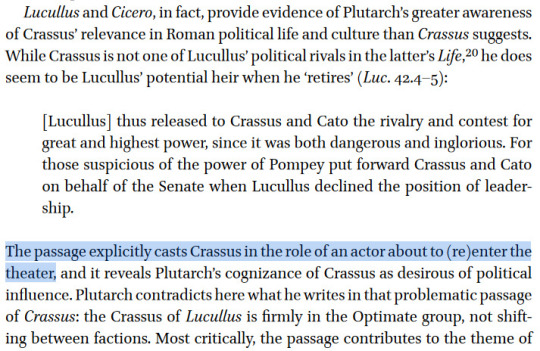
A Life in Pieces, Plutarch, Crassus 12.1-16-8, James T Chlup
Many Things Are Weird About The Main Cast Of The Last Generations Of The Roman Republic. lots of subversions and transgressions happening all over the place.
heughghh to finish this off, I've been thinking about this a lot while I write other things, but uhhhh my thoughts are Not Particularly Coherent. I've been reading lately on the Rizal-Bonifacio relationship and what it means to conflict with someone who is partially responsible for making you what you are—

Decimation: Myth, Discipline, and Death in the Roman Republic, Michael J. Taylor
—and it's bleeding into all the other filing cabinets in my mind.
#maybe there's something else in the way Sulla zeroes in on Pompey#who inherited a crime#whose biography has talk of Fortune#like Sulla#Pompey and Crassus raised their respective armies that they led under Sulla in similar ways#it is. a triangle.#horrible terrible triangle#i also think about how Sulla tried to stamp out Caesar and it didn't work so Caesar like. ran Sulla's playbook even better#that's like stepping into someone else's body and saying 'nice try. my turn.'#so the sulla triangle continues anyway???? something like that.#ANYWAY. i am so sorry for this wall of words. I hope uhhhh that it makes sense. i have thoughts about Sulla's wealth#they are Not coherent. unfortunately. thankfully I write comics not academic papers#ask tag
43 notes
·
View notes